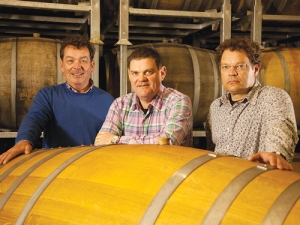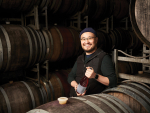To me the word crawler conjures up images of something creepy, lurking in a dark corner waiting to pounce.
But for Marlborough based Giesen Wines a newly imported Crawler is the latest tool in the company’s expansion into organic wines.
It was six years ago that the Giesen brothers, Alex, Theo and Marcel decided to embark on the pathway to organics. They began with a 7.2 hectare vineyard that had been conventionally planted in wide rows, removing all vines and left the land fallow for two years before replanting. The new look totally organic vineyard was close planted with Pinot Noir and Syrah – (not a common variety found in Marlborough at the time).
That first tentative step has paid off and the quality of the fruit and ensuing wines has encouraged one of Marlborough’s oldest wine companies to expand their organic holdings. Currently they have four organic vineyards, totalling 55 hectares. They are also taking a substantial amount of organic fruit from contract growers to add to their portfolio and have a fifth vineyard in transition.
Which brings us to the Crawler, produced by Geier. This all-purpose machine weighs just over a tonne, and replaces the former 2.5 tonne tractor the company used to perform a multitude of tasks in the vineyard. Tasks such as under vine weeding, crop spraying and trimming.
Due to its lack of weight and its small size, (width of 1.1 metres) the Crawler has less downward pressure than a human footprint, ensuring substantially less compaction within the vineyard. It is also far easier to manoeuvre in the closely planted organic vineyards, according to organic vineyards manager Kurt Simsic.
“The rows in these vineyards are only 1.5 metres wide and the bulkier tractors run right beside the grape vines which can damage the plant’s roots. The surface area of the Crawler’s tracks means a significantly better displacement of weight.”
Marcel Giesen says one of those closely planted vineyards is Clayvin.
“In February, after the second year of a 10-year lease, we purchased the vineyard outright. The opportunity to add an exceptional organic vineyard site to the company’s portfolio was too good to pass up. The fact that Clayvin was Marlborough’s first commercial high density hillside vineyard producing some of the region’s finest Pinot Noirs, Chardonnay and Syrah, has allowed the company to extend its organic programme.”
The rest of the company organic blocks are spread across the Wairau Valley, each with its own individual terroir, allowing Giesen’s to concentrate on single vineyard wines.
“Organics and in time biodynamics helps these wines express where they have come from,” Giesen says. “We find the major advantage with organics is there is a natural reduction in yield, often there are smaller berries but higher quality, concentrated flavours, this is supported by increased biological activity in the soil. Typically herbicide would affect this activity”
Giesen admits the move was a decision made not for commercial purposes, but to ensure the future of the vineyards for generations to come. The market reaction therefore has been a welcome surprise.
“We have been surprised by the level of interest in organic wine. There is an increasing group of consumers who are concerned with what they are putting into their bodies and how the environment is being cared for,” he says. “These consumers often have higher discretionary spend and are happy to part with a little more money to enjoy good quality organic wines. This was a requirement from the start – the wines needed to be of the highest quality.”
That quality was recognised when Giesen’s 2013 Organic Sauvignon Blanc gained a Gold Medal at last year’s New Zealand Organic Wine Awards, while the Clayvin Vineyard continues to win plaudits including Trophy –Champion Chardonnay for the The Fuder Clayvin Chardonnay 2011 at the 2013 Marlborough Wine Show and Pure Gold at the 2013 Air New Zealand Wine Awards.
This email address is being protected from spambots. You need JavaScript enabled to view it.














